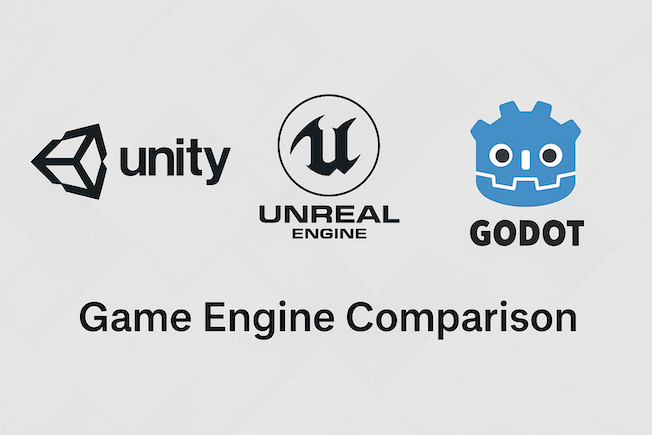Introduction: Choosing the Right Game Engine
Selecting the right platform starts with understanding the differences between engines. This game engine comparison explores Unity, Unreal Engine, and Godot to help you decide which one best fits your creative goals. Your choice affects not only the performance of your game but also how efficiently you can bring your ideas to life. In this article, we’ll explore and compare three of the most popular engines in the industry: Unity, Unreal Engine, and Godot. Each has its own strengths, weaknesses, and ideal use cases.
1. Unity: The All-Rounder for Indie and Mobile Developers
Overview
Unity has become a household name in game development, favored by indie creators and professionals alike. It’s known for its versatility and approachable learning curve, making it a top choice for developers working on both 2D and 3D games.
Key Features
- Cross-platform support: Build once and deploy to Android, iOS, PC, consoles, and even AR/VR.
- C# scripting: Beginner-friendly yet powerful language support.
- Unity Asset Store: A massive marketplace filled with ready-to-use assets and plugins.
- Performance tools: Built-in profilers and optimization systems to fine-tune your game.
Pros
- Huge community and learning resources.
- Great documentation and tutorials.
- Flexible pricing for indie developers.
Cons
- Can become resource-heavy for large projects.
- Visual quality may require additional plugins or shaders compared to Unreal.
2. Unreal Engine: The Powerhouse for High-End 3D Games
Overview
Unreal Engine is the preferred choice for developers aiming for top-tier graphics and cinematic experiences. It powers many AAA titles and offers unmatched visual fidelity, thanks to its photorealistic rendering and powerful lighting systems.
Key Features
- Blueprint visual scripting: No need to code to create complex logic.
- Unreal Marketplace: Access to professional-grade assets and tools.
- Real-time rendering: Ideal for cinematic games and virtual production.
- C++ support: Deep control for advanced developers.
Pros
- Industry-leading graphics and physics engine.
- Robust multiplayer framework.
- Excellent for VR and next-gen platforms.
Cons
- Steeper learning curve.
- Requires higher-end hardware to run smoothly.
3. Godot: The Open-Source Rising Star
Overview
Godot has rapidly gained popularity as an open-source alternative to commercial engines. It’s lightweight, fast, and completely free, making it an excellent option for independent developers and educators.
Key Features
- Open-source and free: No royalties or license fees.
- GDScript: A Python-like language designed for rapid prototyping.
- Lightweight editor: Runs efficiently on modest hardware.
- 2D-first approach: Exceptional performance for 2D projects.
Pros
- Freedom to modify and customize the engine.
- Great for small teams or hobby projects.
- Strong and passionate community.
Cons
- Smaller ecosystem than Unity or Unreal.
- Limited third-party tools and assets.
- Less suitable for large-scale 3D games (for now).
4. Which Game Engine Should You Choose?
Through this game engine comparison, you can easily see how Unity, Unreal, and Godot differ in performance, workflow, and accessibility. The right engine depends entirely on your goals, team size, and target platform:
- Choose Unity if you want a balanced engine with a gentle learning curve, especially for mobile and indie games.
- Choose Unreal Engine if you’re building a visually stunning 3D title or a cinematic experience.
- Choose Godot if you value open-source freedom and lightweight development, particularly for 2D or experimental projects.
No matter which you pick, the most important thing is to start building. Every engine offers a unique way to express creativity and bring worlds to life.
Conclusion: Focus on Creation
At the end of the day, the best game engine is the one that lets you create your game efficiently and enjoyably. Overall, this game engine comparison shows that every platform has unique advantages depending on your project type and experience level. Experiment with each, learn their strengths, and find the tool that aligns with your vision. Whether you’re developing a small indie project or dreaming of the next big hit, mastering your chosen engine is the first step toward success.







